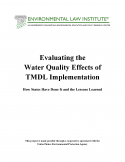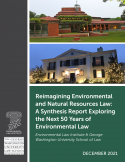
Research Reports
ELI publishes Research Reports available for free download that present the analysis and conclusions of the policy studies ELI undertakes to improve environmental law and policy. These reports contribute to education of the profession and disseminate diverse points of view and opinions to stimulate a robust and creative exchange of ideas. Those publications, which express opinions of the authors and not necessarily those of the Institute, its Board of Directors, or funding organizations, exemplify ELI’s commitment to dialogue with all sectors.
El informe Corrupción en la minería artesanal y de pequeña escala en la Amazonía peruana provee un análisis sobre la problemática, los componentes y los mecanismos de corrupción en la minería artesanal y de pequeña escala (MAPE) ilegal e informal que se realiza en selva Amazónica del Perú. La base que se evalúa en este estudio es la cadena de valor de oro, las etapas de certificación y fiscalización ambiental, y se identifican los puntos de encuentro, las vulnerabilidades y los riesgos de corrupción.
Read More >
Evaluating the implementation of Total Maximum Daily Loads (TMDLs), especially their ultimate effects on water quality, is challenging but important. It is needed to reveal whether a TMDL and implementation actions are working or should be revised. It also provides information about restoration and protection, ideally making future efforts more effective and efficient, and it helps to demonstrate to the public the impact of TMDL programs and other Clean Water Act programs.
Read More >ELI’s Food Waste Initiative is publishing a Research Brief Series to present takeaways from the Initiative’s research, spanning a range of topics important to food waste prevention, recovery, and recycling.
Read More >ELI’s Food Waste Initiative is publishing a Research Brief Series to present takeaways from the Initiative’s research, spanning a range of topics important to food waste prevention, recovery, and recycling.
Read More >
In our 50th anniversary year, ELI partnered with the Environmental and Energy Law Program at George Washington University School of Law to review the state of environmental law and “reimagine” what law might need to look like in the years ahead if we are to achieve a more sustainable future.
Read More >